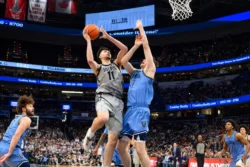An hour and a half before any given Mets game, the collection of fans in the field-level section of Shea Stadium is anything but typical. Instead of the old men and little children normally deemed the only spectators with enough time or enthusiasm to show up for batting practice, the seats are peppered with middle-aged women. Even in today’s world of sexual liberation, it still seems a bit strange to see crowds of longhaired, heavily made-up, tight-jeans-wearing women at a baseball game. Their actions, however, explain everything.
“Mike,” they yell. “Call me!”
“Mike! I love you!”
“Mike, will you marry me?”
As a hot dog vendor at Shea Stadium, I often sat alone watching batting practice and enjoying the weather with little to do; it was useless to start selling dogs so long before the game started. The fans leaning over the railing and reaching towards the field weren’t looking for wieners. At least, not the type I was selling. Women from in and around Queens, New York, came out in droves to try desperately to land their portrait of masculine perfection: Michael Joseph Piazza. Many of the women donned “Mrs. Piazza” jerseys, hold up posters with their phone numbers and are captivated by Mike’s flowing brown locks and somewhat ridiculous facial hair. Still, nothing can top the astonishment in fans of all sexes when Mike Piazza blasts a 500-foot homerun.
So what’s my point, you ask? I’m simply providing an example for my baseball-capitalism argument. After I first outlined my theory for a free market baseball economy (“Expos-?”, Feb. 14), many readers asked me what I thought was wrong with a salary cap. Mike Piazza, and his importance to Met fans and the city of New York, exemplifies why a salary cap just can’t work.
Mike Piazza is the greatest-hitting catcher of all time, hands down. Beyond that, he’s a personable and altruistic baseball celebrity. The point is that the Mets, like many of the NFL teams, would likely have serious difficulties finding room for their best player, Mike Piazza, if a salary cap was imposed in Major League Baseball. The 49ers had to cut Jerry Rice. The Jaguars essentially cut Tony Boselli, and the Jets had to let go of both of their starting cornerbacks and will likely cut their middle linebacker and defensive captain, Marvin Jones.
Many suggest a “franchise player” tag to allow teams to make one player’s salary not count against the cap. Not only is this system obviously ridiculous in the economic sense, as it will cause certain players’ salaries to spiral out of control while the other players’ are kept relatively low, it also usually comes with the prerequisite that the player be on the team for five years. Here’s the kicker: Mike Piazza has only been on the Mets for a little more than three.
Indeed, the amount of years a player plays for a team is no indication of his value. Derrek Lee has been with the Marlins for longer than Mike Piazza has been with the Mets. Who do you think is more of the “franchise player”? The answer is obvious. The idea of a “franchise player” is flawed, just like the salary cap system. Major League Baseball needs to switch to a laissez-faire system, for the sake of players like Mike Piazza everywhere, and for the women that love them.





